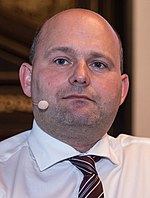Det conservative folk party
| Det conservative folk party | |

|
|
| Party leader | Søren Pape Poulsen |

|
|
| Party leader | Søren Pape Poulsen |
| Group chairmanship in the Folketing | Søren Pape Poulsen |
| Political spokesman | May Mercado |
| Party secretary | Søren Vandsø |
| founding | 1915 |
| Alignment | Conservatism , economic liberalism |
| Headquarters | Copenhagen |
| Number of members | 9,402 (2016) |
| Youth association | Conservative Ungdom |
| Electoral list | C. |
| Sit in the Folketing |
13/179 |
|
International connections |
IDU |
| MEPs |
1/13 |
| European party | EPP |
| EP Group | EPP |
| www.konservative.dk | |
Det Konservative Folkeparti ( K ), Danish for Conservative People's Party , is a political party in Denmark .
history
The Conservatives emerged from the parliamentary right ( Højre ) in 1915 . At that time the party mainly represented the interests of the bourgeoisie in the larger cities. The relationship with the right-wing liberal party Venstre alternated between partnership and competition. In the 1950s, on the initiative of the Venstre chairman Erik Eriksen, negotiations were held to merge the two parties, but this failed because of the conservatives. The original division of the bourgeois camp into a party of the urban bourgeoisie and a representation of agricultural interests lives on to this day in the distribution of the strongholds of both parties: The conservatives are particularly successful in Copenhagen , Frederiksberg and in the north-east of the island of Zealand , Venstre in the rural areas structured regions such as west and south Jutland . The conservative core electorate is mainly drawn from industry and trade, the self-employed, civil servants and parts of the middle class. The conservatives advocate a free market economy and a lean welfare state.
The party's share of the vote was around 20% before the 1973 landslide election, but dropped to around 5% after the appearance of Mogens Glistrup's populist progressive party . In addition to the Progress Party, to which many regular voters defected, it was above all home-made personal quarrels that brought the traditional party to the brink of existence. It was only after Poul Schlüter became chairman and also prime minister in 1982 that the party started to improve again, but after the end of his time as prime minister it steadily fell. In the 1990s there were renewed personal disputes, which led to a fall in voter favor in 1998. The previously rather unknown Bendt Bendtsen was able to temporarily regroup the party and lead it into government in 2001. From 2001 to 2011 she was involved in a minority government with the right-wing liberal Venstre with the tolerance of the national-conservative Danish People's Party .
Under Bendtsen's successor Lene Espersen , the old wing battles flared up again. In January 2011, Justice Minister Lars Barfoed became the new party chairman. In the 2011 parliamentary election campaign, the party tried to free itself from its firm ties to the right-wing populist majority procurers and called for a change in strategy by the bourgeois parties with the aim of seeking new majorities in the middle of the political spectrum in economic, tax and immigration policy. However, the electorate was also unsettled, so that in September 2011 the Conservatives had to accept the worst result in their long party history. You are currently the smallest political group in the Danish Parliament.
Positions
Climate policy
A study from 2019, which looked at the voting behavior of parties on climate policy issues in the EU Parliament, rated the conservatives as “dinosaurs” in relation to climate-friendly politics.
Folk elections
Since the introduction of proportional representation in 1918 (source: Folketingets Oplysning )

Party leadership
|
Political leaders elected by the parliamentary group
|
Chair elected by the party congress
|
See also
literature
- Alexander Horn: The political system of Denmark. Politics, economy and the welfare state in a comparative perspective , Wiesbaden 2019.
Web links
- Det Conservative Folkeparti Official Website
Individual evidence
- ↑ Membership figures 2016 Folketingets Oplysning, accessed on October 28, 2018.
- ^ A b Alexander Horn: The political system of Denmark. Politics, the economy and the welfare state in a comparative perspective , Wiesbaden 2019, p. 43.
- ↑ http://www.caneurope.org/docman/climate-energy-targets/3476-defenders-delayers-dinosaurs-ranking-of-eu-political-groups-and-national-parties-on-climate-change/file